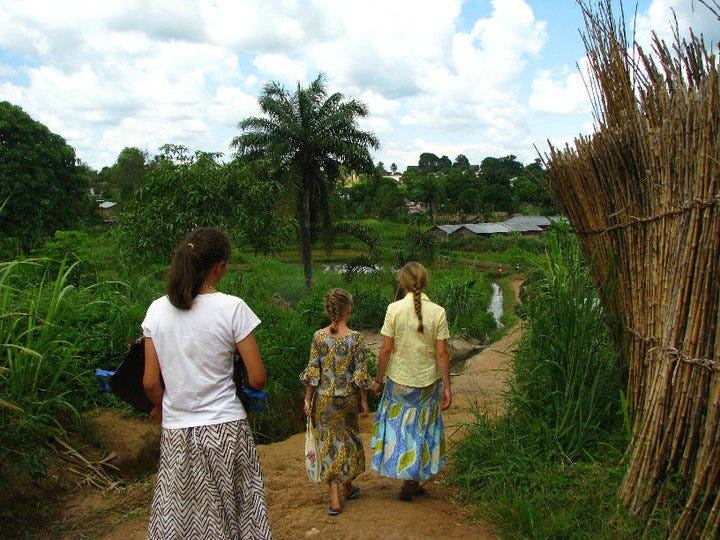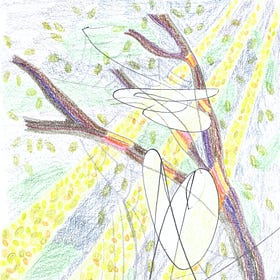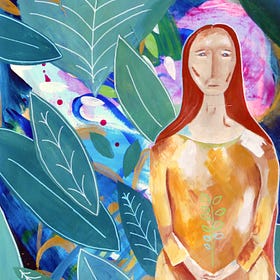Once, in a cathedral built of trees and tin, I watched my uncle walk in the door, one hundred metres of words wound around his index finger. The words smelled like fabric softener and car fluids and airplane tickets. I was his interpreter. In the morning, a cup of water outside to wash his face and brush his teeth, a crowd of children watching and waiting for him to smile. All his words came out gummy like tree sap. The children understood only the smiles. He understood only the church. On the table in the evening were mashed flying ants and his face whitened. I was interpreting my own life: Uncle, eat. I was watching him be the strange one, the single gold button. The wind drooled on his words like an affectionate puppy. He was talking about fathers and sons and forgiveness. A pastor gave him crumbled cookies in tin foil and a juice packet to serve communion: all of it imported from China. I watched it sting his hands. The windows were open. The pastor built a fire and each of us dropped a hurt in. We threw flowers onto the ashes. I remember the clear river. My uncle remembers the emptiness and yet, every plate overflowed with food. He could not stomach it. Years later, when he questioned my salvation, I wanted him to remember how I cleaned my plate. How my hurt looked on fire. Whose hands held my forgiveness. How when the wind blew away his last word, his pupils dilated at the age of the trees. Forgiveness is older than ash, I insist. When people write of this forest they can’t help the metaphors, even I can’t, especially I can’t. Even then, I couldn’t help seeing it all through his eyes. •
This little essay is about a trip I took in my last weeks of being a teenager in the Democratic Republic of Congo. We had traveled deeper into the rainforest, to a small community where I served as interpreter to my uncle. There is a lot of interpreting happening in this short essay. Even in the writing, I am interpreting to you what happened and what my memory holds. How faithful can an interpretation be?
I’d love to hear your recommendations of books that write across cultures well. (And you can also drop your un-recommendations, too!)
And now I ask you to sharply swerve your sense of place, for some very exciting news. My debut poetry book Pin Bones will come out in early 2027, published by Central Avenue Publishing! It still feels surreal, in the best of ways. I wrote Pin Bones in the early years of the covid pandemic on a fish farm here in British Columbia. It is, through and through, a West coast book, and so Central Avenue Publishing (based in Delta, B.C.) feels like a perfect fit. As the poems walk through a year on a fish farm, they examine grief and what it means to love what we cannot protect. Here’s the publisher’s announcement:
I’ll be sharing more as the time gets closer. Right now, I’m drafting some new poems to add to the book and delighted to be, once again, contemplating fish bones and what a fish can hear. (Blending science and metaphor always feels like magic!) I’m deeply grateful to each of you for choosing to come along for this journey of expanding our questions and language. This is your win, too!
Read more short pieces that centre in Congo:
Sugarcane
When I was young, sugarcane grew in the back gardens. Thick clusters of it, looking like a solid bamboo. The green skin flaked off in stiff strips as we bit the ends. We shucked the sugarcane with our teeth, one teenage girl at a time wielding a machete to hack it into lengths: a foot, two feet long. Even the monkey would get some. There was always enou…
How to make mpondu
Weeping spruce is beautiful in a disrepaired way: like a mother who never ties her shoelaces, never combs her hair. I’ve been reading Suzanne Simard’s studies of how firs and birches exchange carbon through the seasons via fungi, a giving and a taking. Simard doesn’t write about the tropics.







Such a beautiful essay, Maaike. And I can't wait for your book! 💙
“The children understood only the smiles. He understood only the church.” And “Years later, when he questioned my salvation, I wanted him to remember how I cleaned my plate. How my hurt looked on fire. Whose hands held my forgiveness.”
I’ll be haunted by these lines. Stunning, Maaike ♥️